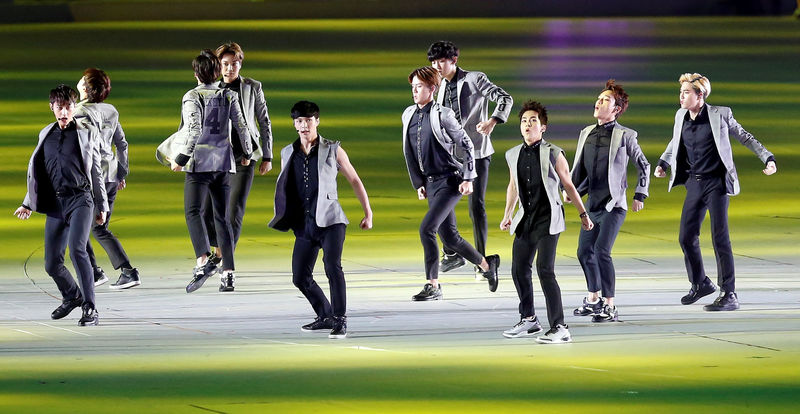By Adam Jourdan and Joyce Lee
SHANGHAI/SEOUL (Reuters) - Cai Yufang, 21, is a big fan of Korean television dramas like "Shopping King Louie", a show about a profligate chaebol heir who loses his memory and learns the value of love and labour from a sweet, simple country girl.
The Shanghai student is one of millions of young Chinese consumers with a huge appetite for South Korean pop culture whose regular viewing habits have been disrupted by growing political tensions between the countries.
The mainland chill on Korean content that follows Seoul's decision to deploy a missile defence system, however, is driving Chinese fans to get their "K-culture" fixes on peer-to-peer platforms instead of mainstream sites such as Youku, Tencent and iQiyi where some content has been taken down. The three sites did not respond to requests for comment.
"Korean dramas, and especially variety shows, are no longer being updated, so I can't watch any more. There are no links – it's a bit annoying, really," said Cai. "For a lot of young Chinese who like Korean culture, it's a real shame."
Cai added that eager viewers were already finding alternative channels. She has started following a group on a Chinese messaging service called "Watch drama together" that provides links to shows on file sharing platforms like Baidu Cloud.
The blackout reflects a wider cultural freeze, with South Korean singers and actors blocked, dozens of Korean-focused blogs suspended, tourism bans and product boycotts.
South Korea's soft power, especially its dramas and music, is a hot commodity.
Production values are generally smarter than those of other Asian markets and its snazzy fashion, hyper-stylized singers and well-choreographed dances have captivated audiences in the region since late 1990s.
China is South Korea's second-largest overseas market for dramas, songs and other media content. The fluid exchange of entertainment products has played a big role in strong, friendly ties between the two trade partners.
But for South Korea stars, recent tensions have hit music concerts to lucrative advertising gigs in China.
S.M. Entertainment (KQ:041510), a music, talent and event promoter that houses popular Korean boy-bands EXO and SHINee, is among scores of firms that say their China businesses are affected following Seoul's decision to deploy a U.S. missile defence system within its borders to deter North Korea.
"Events are being cancelled and it's impacting our business as we expected big revenue generation," said a person familiar with the company's operations who did not want to be named due to sensitivity of the subject.
"This year, our signed singers have no TV performances scheduled in China. They can't do any concerts even if they want to, because approvals will not be issued."
An S.M. Entertainment spokesperson was not immediately available for comment.
A survey by Seoul's culture ministry of 160 local media and entertainment firms that have business ties with China showed 58 respondents reported direct business impacts such as cancellations of contracts, tours or joint production, as well as delays in approvals since tensions began last year.
The diplomatic row further heightened this month after Seoul accelerated plans to set up the Terminal High Altitude Area Defense anti-missile system. South Korea argues THAAD is for defence against North Korea, but China fears its powerful radar can reach into its territory.
Moon Jae-in, the South Korean politician expected to become its next president, called on China on Tuesday to stop economic retaliation against South Korean firms over deployment of the THAAD system.
TESTING TIES
Despite China's affection for Korean culture, geopolitical sentiment is taking an economic toll on the market for its products.
"We ran away fast from South Korean talent for Chinese ads when the tensions began. We're a bit conservative and cautious," said the China head of a major U.S. consumer goods business. He asked not to be named because of the sensitivity of the topic.
South Korean stars have often been used in Chinese adverts from cars to ice cream, cosmetics and smartphones.
A recent report from South Korea's parliament research service said the country's famous K-pop music, live concerts, dramas and adverts had all been hit. It added, though, that illegal downloads of TV shows had spiked.
In an area of Shanghai where many South Koreans live, one Korean barbecue outlet manager told Reuters almost all her Chinese clients had disappeared.
The chill has even spread to popular South Korea-focused blogs - online platforms where millions in China follow Korean pop culture, TV shows or news about their favourite icons.
An analysis by Reuters showed dozens of such blogs said they would suspend new posts this week, citing the tensions between China and South Korea. Many added pictures of the Chinese flag.
"China's interests are more important than anything else," posted the popular "South Korea me2day" blog, which boasts 6.25 million followers on Sina Weibo.
It was not clear how long the suspensions would last and some of the blogs seemed to have re-started posts on Friday.
K-culture fans like Cai and her peers, indeed, said they expected the impact to be short-lived, citing previous examples where Japan and France have drawn Beijing's ire.
"I'm not saying that Chinese people don't remember things," said Lu Kexin, 21, a Beijing fan of Korean girl band Apink.

"But you can never really sever cultural exchange."